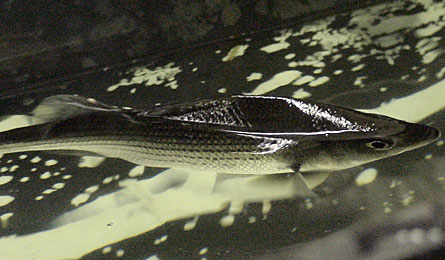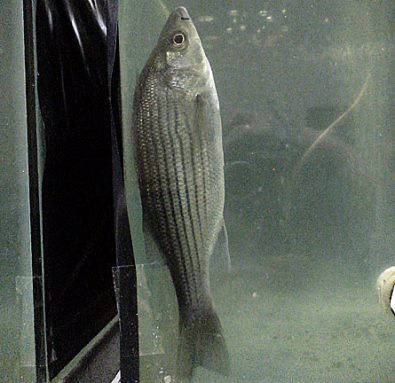Mood-boosting drugs make unhappy fish
Drugs called antidepressants find their way into lakes and streams, affecting the behavior of fish living there in unexpected ways
 |
|
Scientists recently did experiments on several species of freshwater fish to see how they reacted to antidepressants in their water. Normally a bottom-dwelling species, this bass exposed to antidepressants started swimming at the surface, partially out of the water. Its meal of minnows swam freely below, ignored.
|
| Clemson University’s Institute of Environmental Toxicology |
When you’re sick, you might take medicines to help you fight off infection, lower a fever or clear a stuffy nose. But once those drugs leave your body, chances are they will find their way into nearby lakes, ponds, rivers and streams. While medications are meant to help people feel better, they’re not good for wildlife. Scientists have begun to find common drugs in freshwater ecosystems. And they’re learning that drugs meant for people may harm animals that accidentally ingest them.
Drugs end up in a body of water because you excrete them in urine. When you flush a toilet, the wastewater travels to a treatment plant. There, bacteria and other material are filtered out. Then the water gets cleaned and returned to natural bodies of water. The trouble is, wastewater treatment plants don’t filter out most drugs.
Some people even flush unused drugs down the toilet, only adding to the problem.
Recently, several scientists tested affects on fish of drugs used to treat depression. For many people with this mental disease, antidepressants can be lifesavers. People with depression may feel sad or anxious for months to years. They may lose interest in activities they once enjoyed. They can have difficulty sleeping or concentrating. Antidepressants can help improve these symptoms in many people.
Several years ago, researchers discovered that some species of fish living near wastewater treatment plants had antidepressants in their brains. “Pretty much any water sample in the vicinity of a wastewater treatment plant will test positive for some group of antidepressants,” says chemist Melissa Schultz. She works at the College of Wooster in Ohio. Her data inspired a number of scientists to learn how these drugs affect fish and other wildlife.
Researchers exposed fish in the lab to different brands of depression-fighting drugs. Then, the scientists tested how the fish responded to a number of things. These included the cues that predators make or the appearance of prey animals.
 |
|
Some hybrid striped bass exposed to the antidepressant Prozac eventually began hanging vertically in the water — a highly unlikely pose — and stopped eating.
|
| Clemson University’s Institute of Environmental Toxicology |
Antidepressants affect fish species in numerous ways, the studies showed. They diminished the animals’ response to predators. They also could slow their prey-hunting techniques. One unexpected result: one antidepressant, called fluoxetine (Flu-OX-eh-teem) acts like estrogen, or female reproductive hormone, in the bodies of adult male fathead minnows.
Fluoxetine, sold under the brand name Prozac, caused these male minnows to produce an egg protein that normally only females would make. What’s more, males exposed to fluoxetine did not make the bright colors and facial bumps needed to attract mates. More testing needs to be done to determine whether these changes affect minnows’ ability to mate.
It’s important to keep in mind that in any lake or stream, fish and other organisms aren’t just exposed to antidepressants, Schultz says. Antibiotics, anti-inflammatories, and even caffeine all make their way through water treatment plants and back into the environment. What happens to fish and other animals when they’re exposed to all of these drugs in combination? For now, nobody knows, Schultz says – leaving the door open to many future research questions.
Fast Food from Science News on Vimeo.
This video shows a hybrid striped bass quickly gobbling up four minnows. Fed only once every three days, the bass tend to become quite aggressive about downing their meals. After being exposed to high concentrations of Prozac, however, some bass took up to two minutes to capture their first minnow and didn’t finish all four with the allotted 25 minutes. Over the nearly month-long experiment, a few bass lost their appetites altogether.
Source: Clemson University’s Institute of Environmental Toxicology







